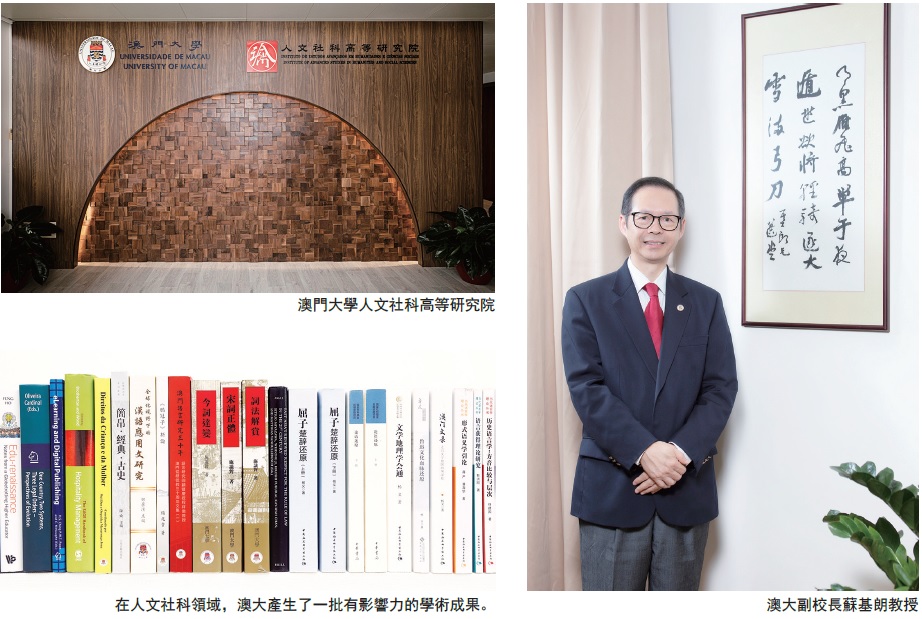高研院打造人文社科研究平台
高研院打造人文社科研究平台
為促進人文社科研究、推廣人文社科和科技的結合,澳門大學成立人文社科高等研究院(簡稱高研院),致力打造跨越學院疆界的校級研究平台,建設澳大跨學科國際水平研究團隊,實現學術資源協同效應的戰略佈局。
打造跨越學院疆界的校級研究平台
高研院是澳大學術單位之一,二零一九年底成立,由澳大副校長蘇基朗教授兼任代院長。蘇教授是歷史學家,專長中國法制史、海洋史和社會經濟史等跨學科領域。他表示,高研院將會統籌人文學院、社會科學學院、工商管理學院、教育學院和法學院的精英研究力量,引進高端人文社科人才,開展專題研究。
因應粵港澳大灣區發展,澳門特別行政區正在打造以中華文化為主流、多元文化共存的交流合作基地,需要人文社會科學為之提供綜合性的、跨學科的理論支持和制度基礎。蘇教授認為,高研院的設立,正是牢牢把握灣區深度融合、協同發展這一歷史機遇,充分利用特區的地理區位優勢,努力發揚澳門中西結合、兼容並包的社會傳統。
「3+3+3+3」為骨幹的研究戰略佈局
澳大制定了「3+3+3+3 」研究戰略佈局,包括三間國家重點實驗室(中藥質量研究、模擬與混合信號超大規模集成電路、智慧城市物聯網)、三個重點發展方向(精準醫學、先進材料、區域海洋)、三個跨學科交叉領域(認知與腦科學、人工智能與機器人、數據科學)、三個人文社科研究平台(人文社科高等研究院、澳門研究中心、亞太經濟與管理研究所)。在這些領域,澳大重點研究世界尖端學術問題、鼓勵跨學科合作,打破學科壁壘,結合人文社會科學和現代科技。
開展三大專項研究領域的團隊建設
作為人文社科研究平台,高研院將一步推動人文社科的跨領域和跨學科研究,構建高水準、跨學科、國際化、富有競爭力的綜合學術研究平台。
高研院將展開三個重大專項研究領域的團隊建設,包括中華文明與文化交流、文理滙流創新機、環球視野下的澳門。蘇教授說:「這三項重大專項研究領域,以頂層設計的方式,邀請個別研究有成的校內學者為主持人,圍繞重大專項研究領域展開子項目研究計劃,以期通過文理交叉、跨科越界、協同合作的團隊方式,創造影響深遠的學術突破點。」
回饋澳門社會為己任
在澳門多元文化的背景下,澳大的人文社科教研彰顯了獨特的優勢和視角。澳大目前有五個學院歸屬於廣義的人文社會科學範疇,涵蓋語言、歷史、文學、宗哲、法律、經濟、管理、商科、教育、傳播、社會、心理、政治等。澳大在中國歷史文化、澳門地方史、葡語教育、憲法與基本法、旅遊與博彩管理、澳門教育發展、經濟模型、犯罪學、心理學、傳媒研究等領域成績斐然,在社會科學總論領域更進入基本科學指標資料庫(ESI)前1%。
澳大近年還積極推動中國歷史文化在葡語系國家的傳播與影響,同時著力提高澳門居民對中國歷史文化的認識。澳大崇文樓滙聚高研院、澳門研究中心、中國歷史文化中心、孔子學院、中葡雙語教學暨培訓中心、藝術設計中心及澳門中小學生人文社科教育基地等富實力的人文社科教研單位,全力促進澳門成為大灣區以至世界的中外文化交流中心。此外,澳大也是國家教育部人文社科重點研究夥伴基地,大力加強在人文社科領域的發展。
蘇教授強調說:「高研院不僅促進大學範圍內的人文和社科研究,培養學有所成的青年才俊,推廣人文和科技領域的跨界合作,還以回饋澳門社會為己任,透過建構跨領域的綜合性本地智庫,通過不同政策範疇的理論開發和實證調研,以期為澳門特區行穩致遠、融入灣區並參與灣區建設,儘力作出貢獻。」
「駐院學人計劃」吸引海內外人文社科學者
高研院設立了「駐院學人計劃」,吸引海內外人文社科頂尖學者訪駐澳大,與澳大學者一同探究高端人文學術課題,促進澳門人文社科學術的研究與交流。「駐院學人計劃」分為校內學人及訪問學人兩類,接受校內外學者申請。校內學人計劃為研究成果即將結項的優秀澳大學者提供代課經費等條件,協助其順利完成卓越學術著作。訪問學人計劃為校外資深或領軍學者而設,同時亦培養優秀年輕學者,讓後者有機會與資深學人及澳大學者,在高研院日夕問學,切磋砥礪,互相啟發。來訪學者或致力研究團隊建設,或在澳大高研院專心著述,均不難巧遇同道中人。根據訪問計劃及資歷,來訪學者將獲得澳大不同程度的資助。
來源:《澳大新語》第二十二期

---------------------------------------------------
IAS Creates a Research Platform for Humanities and Social Sciences
The University of Macau (UM) has established the Institute of Advanced Studies in Humanities and Social Sciences (IAS) to promote research in the humanities and social sciences, and their collaboration with technology. Essentially, IAS aims to create a university-level, cross-faculty research platform, build world-class interdisciplinary research teams, and form a strategic synergistic structure to drive the sharing of academic resources.
A University‑level, Cross‑faculty Research Platform
Founded in 2019, IAS is headed by UM Vice Rector Prof Billy So, who serves as the institute’s interim director. He is a historian who specialises in the legal, maritime, and socio‑economic history of China. According to Prof So, IAS will coordinate the efforts of various faculties, including the Faculty of Arts and Humanities, Faculty of Social Sciences, Faculty of Business Administration, Faculty of Education, and Faculty of Law, to share vital resources and optimise research capabilities. He adds that the institute will recruit top‑tier scholars to work on special research projects.
In response to the development of the Guangdong - Hong
Kong‑Macao Greater Bay Area, the government of the Macao Special Administrative Region (SAR) hopes to develop the city into a centre for exchange and cooperation with Chinese culture as the mainstream and the coexistence of different cultures. This initiative certainly requires comprehensive and cross‑disciplinary support. According to Prof So, the establishment of IAS is part of UM’s effort to seize the historic opportunities presented by the integration of the cities in the Greater Bay Area, and IAS will leverage the city’s geographical advantage, its inclusiveness, and its cultural diversity.
A ‘3+3+3+3’ Strategic Research Structure
UM has formulated a ‘3+3+3+3’ strategic research structure. The four ‘3’s in the strategy refer to the university’s three state key laboratories (for integrated circuits, Chinese medical sciences, and internet of things for smart cities, respectively), three new key research areas (precision medicine for cancer treatment, advanced materials, and regional oceanography), three interdisciplinary research fields(artificial intelligence, cognitive and brain science, and data science), and three research platforms for the humanities and social science (IAS, Centre for Macau Studies, and Asia - Pacific Academy of Economics and Management). In all these areas, UM supports cutting - edge research, interdisciplinary collaboration, and the integration of new technologies.
Developing Research Clusters in Three Key Areas
As a research platform in the humanities and social sciences, IAS hopes to enhance UM’s interdisciplinary research and develop an integrated, internationalised, and competitive academic platform. IAS has identified three keys areas where research clusters will be developed, namely Chinese civilisation in multicultural mélange; the convergence of arts, humanities and sciences; and Macao from a global perspective. ‘In these three areas, we will develop research teams with a top‑down approach, with accomplished UM scholars serving as the team leaders. These teams will carry out interdisciplinary and collaborative research in order to achieve breakthroughs,’ says Prof So.
IAS has identified three keys areas where research clusters will be developed, namely Chinese civilisation in multicultural mélange; the convergence of arts, humanities and sciences; and Macao from a global perspective. ‘In these three areas, we will develop research teams with a top‑down approach, with accomplished UM scholars serving as the team leaders. These teams will carry out interdisciplinary and collaborative research in order to achieve breakthroughs,’ says Prof So.
Committed to Contributing to Macao
Firmly rooted in Macao’s multiculturalism, UM’s teaching and research in the humanities and social sciences have unique advantages. The university has five faculties in the humanities and social sciences, offering programmes in a wide array of disciplines, including linguistics, history, literature, philosophy, religious studies, law, economics, management, business, education, communications, sociology, psychology, and political science. Noteworthy achievements have been made in areas such as Chinese history and culture, local history of Macao, Portuguese language education, the constitution and the Basic Law, tourism and gaming management, development of education in Macao, economic models, criminology, psychology, and media studies. In the Essential Sciences Indicators (ESI)rankings, UM is among the top 1 per cent in Social Sciences, General.
UM is committed to disseminating Chinese history and culture in Portuguese‑speaking countries, as well as enhancing Macao residents’ understanding of Chinese history and culture. At UM, the Cultural Building houses IAS, the Centre for Macau Studies, the Centre for Chinese History and Culture, Confucius Institute, Chinese‑Portuguese Bilingual Teaching and Training Centre, the Centre for Arts and Design, and Macao Base for Primary & Secondary Education in Humanities and Social Sciences. Together, they support Macao’s effort to become a regional, or even global, cultural exchange centre. Furthermore, two research centres at UM are now official partners of two Ministry of Education Key Research Institutes in Humanities and Social Sciences.
Prof So says, ‘IAS is dedicated to promoting university‑wide research in the humanities and social sciences, nurturing young talent, and stimulating collaboration between humanities and sciences. It also aspires to be a comprehensive and cross‑disciplinary local think tank that generates theoretical and empirical studies in different policy fields. These efforts intend to support the sustainable development of Macao, and to enhance the SAR’s participation in the development of the Greater Bay Area.’
Fellowship Scheme Targeted at Scholars at Home and Abroad
IAS has launched a Fellowship Scheme to encourage top scholars at home and abroad to conduct cutting‑edge research at UM as IAS fellows, and to promote research and exchange in humanities and social sciences in Macao. The scheme is divided into two categories, for regular UM staff and applicants who are not regular staff. The scheme provides outstanding UM scholars who are nearing the completion of their research projects with funding to help them complete their academic works. The other category is for senior or leading scholars from outside the university. It also aims to nurture excellent young scholars by enabling them to work with senior visiting scholars and UM scholars at IAS. Visiting scholars will receive different levels of funding from UM based on the specific dimensions of their visiting programmes and personal backgrounds.
Source: UMagazine Issue 22
- Log in to post comments





